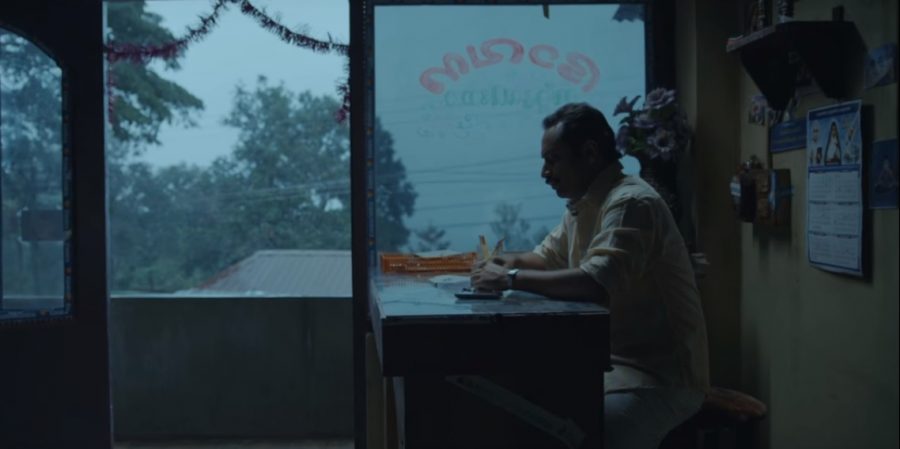In an old aristocratic household in a quiet Kerala village, live three old men and a lonely little boy. One night, the boy wakes up from sleep, and looks out of his window, to see torrential downpour. He steps out of his room, and goes to the verandah, and sees one of the old men drawing water from the well in the courtyard. “Why are you doing this when it’s raining heavily?”, asks the boy, and the old man laughs out. “You must be kidding, boy!” When he is on the verandah, the boy notices that there is absolutely no sign of rain on his body or clothes, as if there was no rain at all. Was there rain at all?
In Adoor Gopalakrishnan’s Anantaram (1987), rain is a spell cast by an invisible magician.
Padmarajan’s Thoovanathumbikal was released in theatres the same year as Anantharam. If Adoor used rain as a curtain to separate reality from dream, Padmarajan used it as a mystic cupid that heralds the romantic relationship of Jayakrishnan (Mohanlal) and Clara (Sumalatha). The first time the couple meets in a hotel room, it is raining heavily outside their window. They fall in love, and the morning after, she disappears, leaving no trace.
The famous Perumbavoor Raveendranath G composition, Megham Poothu Thudangi, penned by Sreekumaran Thampi, talks about their sweet first encounter:
“The clouds have bloomed,
Desires are pouring down
And the earth heard a new beat in its heart”
Many months later, a letter arrives to him from her, on a rainy afternoon, announcing her visit. Padmarajan, in his inimitable style, infuses the beauty and intensity of rain into Clara.
***
It’s only natural that Malayalam cinema has several marvellous rain sequences, for Kerala, the favourite region of South-West Monsoon in the peninsula, is bestowed with a long rainy season.
In Shaji N Karun’s Piravi, rain is the manifestation of the grief of a father who is searching for his missing son whom the state forces whisked away during the tumultuous period of Emergency. The pathos of Piravi is unbearably heavy. Shaji N Karun and cinematographer Sunny Joseph use rain to punctuate the emotional turbulence in the narrative.
Director Kamal has an affinity for rain on screen. One of the most famous rain songs in Mollywood belongs to his film, Azhagiya Raavanan. The lyrics of Pranayamani Thooval tosses in several cute prefixes for rain:
“The rain that falls furtively in the middle of the night, like my secret first love”
Kamal’s Mazhayethum Munpe (Before the rain) and Megha Malhar have a reference to rain in their title. In Madhura Nombarakkattu (The Bitter Sweet Wind), rain divides the time-frame of the narrative. The film begins on the rough arid terrain of Palakkad where there is no sign of rain, and a flashback sequence shifts you to wet green village where the protagonist, Vishnu (Biju Menon), hails from. His younger sister loves playing in the rain, and one evening, she sneaks out of her house to enjoy the rain, away from the watchful eyes of her sister-in-law, Priyamvadha (Samyuktha Varma). A tragedy unfolds then. She is brutally raped by a friend of Vishnu, and when Priyamvadha finds this out, she murders the man in a fit of rage. As though rain acted as a facilitator for the crime, the film takes the couple away from this rainy village forever.
In Bharathan’s Padheyam, it is a rainy night that works as the turning point in the storyline. On an evening, Kolkata is sunk in heavy floods and cloudburst, a young woman takes shelter in a friend’s house. The cold and the heavy downpour stir them up, and the friends become lovers that night. Their lovechild, Haritha, is the anchor of the film’s narrative.
Vaishali, directed by Bharathan, is the story of an ancient kingdom which has seen no rain for the past 12 years. The king and his team entrust a young girl with a mission to bring the teenage son of a powerful monk who resides in the forest, to the country, for he alone can perform a special ritual to make rain. The girl lands in the forest, meets the boy, and the two fall in love. In Vaishali, romance unfurls under a sunny sky, and the arrival of rain spells doom for the lovers. The film culminates in a rain dance, with the whole kingdom dancing in the shower. However, the happy moments are inter-cut with the tragedy that befalls Vaishali whom the king and the countrymen betrays mercilessly.
Recommended
Of late, rain has been used rather as a set prop than as a narrative element. In Amal Neerad’s 2007 film, Big B, the highlight was the stylised camerawork that captured falling rain in slow motion. It is at a funeral Mammootty’s Bilal is introduced. It is a spectacular sequence. You see a line of black umbrellas first. Mourning relatives of the deceased, Mary teacher, walk in the procession, getting drenched in the falling rain. Suddenly, from a black vehicle parked in one corner, emerges Bilal – a shot of his shoes, splashing rain water around, then an overhead shot of his umbrella. Amal Neerad effectively uses rain in many scenes in Big B, to accentuate emotions and often, to add some gloss to the visuals.
In 2015, RS Vimal set his film, Ennu Ninte Moideen, on the backdrop of incessant heavy rain. In the film, a tale of two star-crossed lovers, there is rain as a witness to every crucial event in the couple’s life. The visuals in the film, captured by Jomon T John, are stunning, yet the magic that was seen in Thoovanathumbikal is absent in Ennu Ninte Moideen, for here the rain looks like an element of production design, added to the film to make it glossier.
In Dileesh Pothan’s Maheshinte Prathikaram, an overcast sky and occasional rain represent the blues of Mahesh (Fahadh Faasil). His lover has betrayed him. He was humiliated in front of the people he knows by a bunch of bullies. His esteem is running low. And there comes the song, Cheru Punchiri Innale, where a cool colour palette is used to denote the gloom. When Mahesh finds love again, the weather becomes brighter. The lyrics of the song, “Mounangal Mindomoree” has a poetic line,
“ഇന്നെൻ നെഞ്ചം നീലാകാശം
And today, my mindscape is a bright blue sky”
A D V E R T I S E M E N T
Finally, the sweet fragrance of summer has arrived in Mahesh’s modest life.
***



